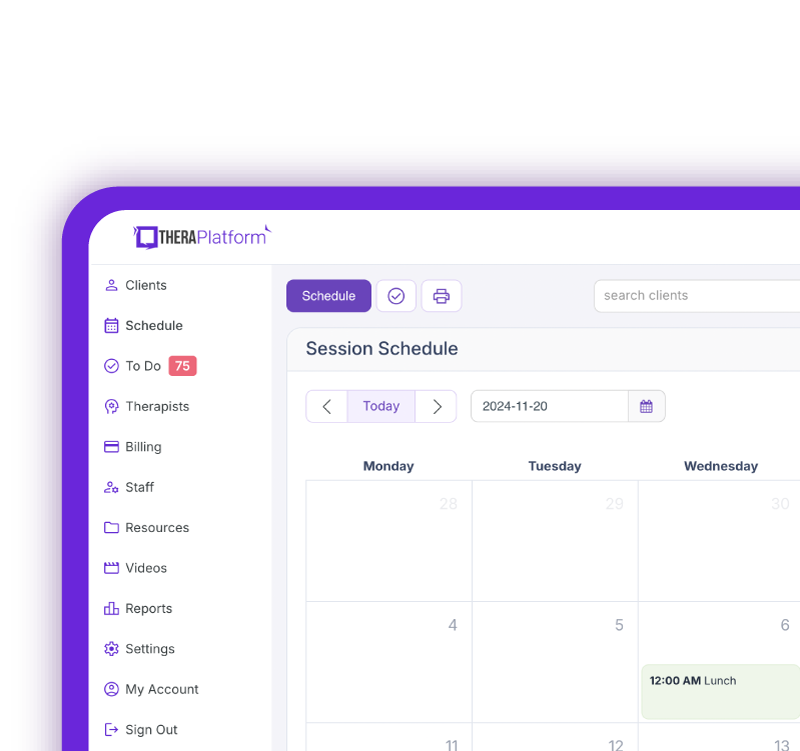Client engagement in therapy: Strategies to strengthen the therapeutic relationship beyond sessions

Client engagement in therapy refers to the ongoing process of building and maintaining meaningful interactions that extend beyond scheduled sessions. It encompasses every touchpoint, from the first inquiry to intake, between-session communication, and even post-discharge follow-up.
Summary
- Strong therapeutic alliances predict better treatment outcomes and lower dropout rates, while also supporting practice sustainability. Download my therapeutic questions for clients PDF.
- From first inquiry to intake, waitlist management, and post-discharge follow-up, engagement beyond sessions builds trust and strengthens client relationships.
- Features like online scheduling, client portals, email campaigns, and AI-powered resources simplify engagement and reduce barriers for clients. An all-in-one EHR, such as TheraPlatform, helps therapists manage these tasks with ease.
- A practice that prioritizes client connection gains higher retention, more referrals, and a stronger reputation in the community.
Streamline your practice with One EHR
- Scheduling
- Flexible notes
- Template library
- Billing & payments
- Insurance claims
- Client portal
- Telehealth
- E-fax

Client engagement in therapy encompasses not only clinical care but also effective communication, accessibility, and resource sharing.
Research consistently shows that client engagement in therapy is a critical factor in treatment outcomes and practice sustainability.
For instance, a large meta-analysis by Flückiger, Del Re, Wampold, and Horvath (2018), which reviewed nearly 300 studies and over 30,000 patients, found that the therapeutic alliance, an essential element of engagement, was among the strongest predictors of positive treatment outcomes across therapy modalities.
In other words, when clients feel connected and supported, therapy is more effective.
For private practitioners, client engagement in therapy is not only necessary for client wellbeing but also for business growth. A practice that fosters connection beyond the therapy hour strengthens trust, improves retention, and builds its reputation.
This article will explore evidence-based strategies to strengthen engagement outside of sessions, highlight where AI and digital tools can enhance that process, and provide practical ways to weave these approaches into daily practice.
Practice Management + EHR + Telehealth
Manage more in less time in your practice with TheraPlatform

Why client engagement in therapy matters in private practice growth
Retention of current clients
Retaining existing clients is often more cost-effective than constantly pursuing new ones. In business and marketing research, keeping a customer can cost five to seven times less than acquiring a new one (Reichheld, 1996).
While this data comes from the broader business world, the principle applies to therapy as well: the stronger the relationship and engagement, the more likely clients are to stay and complete treatment plans.
Moreover, clients who feel supported between sessions are less likely to disengage prematurely, a common issue in psychotherapy where dropout rates have historically been as high as 47% (Wierzbicki & Pekarik, 1993).
More recent data suggest an average dropout rate closer to 20% (Swift & Greenberg, 2012), showing progress but also highlighting the ongoing need for engagement.
Watch this video to discover TheraPlatform’s EHR benefits for your practice
Converting inquiries into clients
First impressions carry tremendous weight. A streamlined intake process and prompt response to inquiries can make the difference between a client scheduling a session or moving on to another provider.
Research shows that responsiveness increases conversion, and clients are more likely to choose providers who make scheduling and communication easy.
According to a consumer survey by GetApp (2020), 94% of clients reported being more likely to choose a service provider if online scheduling was offered. This demonstrates the importance of accessibility in the earliest stages of engagement.
Supporting clients on a waitlist
High-demand practices often face the challenge of managing waitlists. During this period, potential clients can feel forgotten and disengage before therapy even begins.
While direct research on this specific issue is limited, emerging practice models suggest that providing psychoeducational resources, wellness tips, or periodic check-ins can help maintain client interest and reduce attrition.
AI can also play a role here by automating personalized check-ins, resource delivery, or simple reminders that assure clients they remain a priority.
Improving treatment outcomes
Engagement beyond sessions improves therapy effectiveness. Between-session supports, such as guided worksheets, journaling prompts, or secure messaging, help clients apply skills in real-life situations.
Research by Andersson & Titov (2014) found that blended models, which combine traditional therapy with digital support, increased both effectiveness and satisfaction. Therapists can enhance this process with AI-driven tools that generate customized journaling prompts or mindfulness exercises, tailored to each client's needs.
Fostering long-term trust
Engagement helps foster trust, which can lead to booster sessions, long-term support, or referrals. As Carl Rogers observed, "When someone really hears you without passing judgment on you, without trying to take responsibility for you, without trying to mold you, it feels damn good."
By extending care beyond the therapy hour, therapists communicate the same sense of unconditional positive regard in more tangible ways.
Channels for client engagement outside the therapy session
Website: Your digital front door
Your website is often the first impression a potential client has of your practice.
Beyond basic information, it should showcase your expertise, accessibility, and human presence.
- Expert voice: Blogs, resource libraries, and FAQs educate clients while also boosting your website's visibility through SEO. AI tools can help brainstorm blog ideas or draft outlines, thereby reducing the burden of content creation.
- Ease of access: Online scheduling is increasingly expected. Offering this can make your practice more attractive.
- Personal connection: Video introductions or a warm welcome message can help potential clients feel an immediate sense of trust.
- Calls to action: Whether it's "Schedule Now," "Download a Resource," or "Join Our Email List," clear CTAs guide clients toward engagement.
Social media: Building community and connection
Social media humanizes your practice and helps destigmatize therapy. The American Psychological Association (2021) noted that social media platforms can be powerful for psychoeducation.
Content ideas include:
- Bite-sized therapy tips
- Infographics with mental health statistics
- Behind-the-scenes posts to build authenticity
- Short videos on coping strategies
- Announcements about new groups or services
AI can enhance this process by generating caption drafts, creating engaging graphics, or even analyzing engagement data to help refine your content strategy.
Free Resources for Therapists
Click below and help yourself to peer-created resources:

Email marketing: Personalized connection
Email remains one of the most effective engagement tools. Campaign Monitor (2022) reported that personalized emails deliver significantly higher engagement than generic ones. The key is to strike a balance between frequency and value, as sending 1 to 2 emails per month is often sufficient.
Types of emails may include:
- Appointment reminders
- Newsletters with psychoeducational content
- Seasonal self-care check-ins
- Welcome series for new clients
AI-driven email platforms can personalize subject lines, segment client lists, and automate delivery, ensuring that clients receive timely and relevant communication.
Lead magnets and resource sharing
Lead magnets—free, valuable resources provided in exchange for email signup—help build ongoing engagement with prospective clients.
Examples include:
- 5 Ways to Cope with Anxiety Between Sessions
- Guided meditation recordings
- Journaling prompts for emotional regulation
AI can help generate these materials quickly, while therapists provide clinical oversight to ensure accuracy and alignment with therapeutic goals.
EHR and client portals
Client portals have become a standard feature of modern practices. They centralize communication and provide practical support through features like appointment reminders, secure messaging, billing, and document sharing.
Research shows that automated reminders can modestly reduce no-shows, though the degree varies by setting (Kheirkhah et al., 2016). Even minor improvements can enhance retention and practice sustainability. AI-driven portals can adapt reminder frequency based on client history or automatically suggest resources based on session content.
Practice Management + EHR + Telehealth
Manage more in less time in your practice with TheraPlatform

Curated client resources
Providing resources, such as blogs, handouts, videos, podcasts, or book lists, extends the therapeutic value beyond the hour. Hosting these on your website or distributing via email adds ongoing value.
AI can assist by curating and summarizing resources, or by helping therapists create custom guides tailored to individual client needs.
Making engagement easy and accessible
For engagement to be effective, it must also be easy to use. This means minimizing barriers and centralizing access:
- Embedding scheduling links directly on websites and social media.
- Offering secure messaging through portals.
- Providing clear pathways to downloadable resources.
- Using link trees or digital hubs to consolidate access to multiple channels.
- AI-powered tools can further simplify this by guiding clients through portals with chat-based navigation, personalizing suggested resources, or tracking engagement data to highlight what's most effective.
The results of high engagement
When practices invest in engagement strategies, the benefits compound:
- Better outcomes: Strong therapeutic alliances improve results across treatment types (Flückiger et al., 2018; Flückiger et al., 2020).
- Stronger retention: Even modest reductions in no-shows and dropouts translate into more consistent care and greater practice stability.
- More referrals: Clients who feel supported are more likely to recommend services to others.
- Practice growth: Consistent engagement builds reputation, sustainability, and trust.
Building a private practice is not just about what happens in the therapy room; it's also about what happens outside of it. True success stems from fostering meaningful client engagement in therapy throughout the alliance, from the initial inquiry to long-term support.
Strategies like well-designed websites, thoughtful social media presence, targeted email outreach, robust client portals, and curated resources all contribute to strengthening client engagement in therapy, improving outcomes, and supporting sustainable practice growth.
Today's digital tools, including AI-driven resources, offer new opportunities to make this engagement easier, more personalized, and more effective.
While AI should never replace the human connection at the heart of therapy, it can support therapists by streamlining communication, generating resources, and analyzing data to guide strategy for client engagement in treatment.
Therapists who embrace these approaches position themselves not just as providers but as trusted partners in their clients' healing journeys.
Streamline your practice with One EHR
- Scheduling
- Flexible notes
- Template library
- Billing & payments
- Insurance claims
- Client portal
- Telehealth
- E-fax

Resources
Theraplatform is an all-in-one EHR, practice management and teletherapy solution with AI-powered note taking features that allows you to focus more on patient care. With a 30-day free trial, you have the opportunity to experience Theraplatform for yourself with no credit card required. Cancel anytime. They also support different industries including mental and behavioral health therapists in group practices and solo practices.
More resources
- Therapy resources and worksheets
- Therapy private practice courses
- Ultimate teletherapy ebook
- The Ultimate Insurance Billing Guide for Therapists
- The Ultimate Guide to Starting a Private Therapy Practice
- Mental health credentialing
- Insurance billing 101
- Practice management tools
- Behavioral Health tools
Free video classes
- Free on-demand insurance billing for therapist course
- Free mini video lessons to enhance your private practice
- 9 Admin tasks to automate in your private practice
References
Flückiger, C., Del Re, A. C., Wampold, B. E., & Horvath, A. O. (2018). The alliance in adult psychotherapy: A meta-analytic synthesis. Psychotherapy, 55(4), 316–340. https://doi.org/10.1037/pst0000172
Kazantzis, N., Whittington, C., & Dattilio, F. (2018). Meta-analysis of homework effects in cognitive and behavioral therapy: A replication and extension. Clinical Psychology: Science and Practice, 17(2), 144–156. https://doi.org/10.1111/j.1468-2850.2010.01204.x
Lambert, M. J., Whipple, J. L., & Kleinstäuber, M. (2018). Collecting and delivering progress feedback: A meta-analysis of routine outcome monitoring. Psychotherapy, 55(4), 520–537. https://doi.org/10.1037/pst0000167
APA Division 29 (Society for the Advancement of Psychotherapy): Resources on alliance and engagement research – https://societyforpsychotherapy.org
International Center for Clinical Excellence (ICCE): Training and tools for feedback-informed treatment – https://www.centerforclinicalexcellence.com
Society for Psychotherapy Research (SPR): Access to current studies on therapeutic alliance and engagement – https://www.psychotherapyresearch.org
FAQs about client engagement in therapy
Why is client engagement important in therapy?
Client engagement strengthens the therapeutic alliance, which research shows is one of the strongest predictors of positive treatment outcomes. It also improves retention, reduces dropouts, and supports long-term practice growth.
How can therapists increase engagement outside of sessions?
Therapists can enhance engagement through tools like online scheduling, secure messaging, personalized email check-ins, and curated client resources such as worksheets or mindfulness exercises. An all-in-one EHR like TheraPlatform simplifies managing these tasks.
What role does technology play in client engagement?
Technology—especially AI and integrated EHR systems—helps automate communication, share resources, and personalize support between sessions. This reduces administrative work and allows therapists to focus more on client care and connection.



